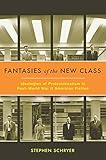Fantasies of the New Class : Ideologies of Professionalism in Post-World War II American Fiction / Stephen Schryer.
Material type: TextPublisher: New York, NY : Columbia University Press, [2011]Copyright date: ©2011Description: 1 online resource (288 p.)Content type:
TextPublisher: New York, NY : Columbia University Press, [2011]Copyright date: ©2011Description: 1 online resource (288 p.)Content type: - 9780231157575
- 9780231527477
- American fiction -- 20th century -- History and criticism
- Elite (Social sciences) in literature
- Literature and society -- United States -- History -- 20th century
- Professional employees in literature
- Professional employees -- United States -- History -- 20th century
- Social classes in literature
- LITERARY CRITICISM / American / General
- 813/.54093552 22
- PS374.S68 S35 2011
- online - DeGruyter
- Issued also in print.
| Item type | Current library | Call number | URL | Status | Notes | Barcode | |
|---|---|---|---|---|---|---|---|
 eBook
eBook
|
Biblioteca "Angelicum" Pont. Univ. S.Tommaso d'Aquino Nuvola online | online - DeGruyter (Browse shelf(Opens below)) | Online access | Not for loan (Accesso limitato) | Accesso per gli utenti autorizzati / Access for authorized users | (dgr)9780231527477 |
Browsing Biblioteca "Angelicum" Pont. Univ. S.Tommaso d'Aquino shelves, Shelving location: Nuvola online Close shelf browser (Hides shelf browser)

|

|

|

|

|

|

|
||
| online - DeGruyter Socialism Unbound : Principles, Practices, and Prospects / | online - DeGruyter Henry Stubbe and the Beginnings of Islam : The Originall & Progress of Mahometanism / | online - DeGruyter What Does a Jew Want? : On Binationalism and Other Specters / | online - DeGruyter Fantasies of the New Class : Ideologies of Professionalism in Post-World War II American Fiction / | online - DeGruyter New Perspectives on International Migration and Development / | online - DeGruyter The Lovelorn Ghost and the Magical Monk : Practicing Buddhism in Modern Thailand / | online - DeGruyter Voices from Iraq : A People's History, 2003-2009 / |
Frontmatter -- CONTENTS -- Acknowledgments -- INTRODUCTION -- 1. The Republic of Letters: THE NEW CRITICISM, HARVARD SOCIOLOGY, AND THE IDEA OF THE UNIVERSITY -- 2. "Life Upon the Horns of the White Man's Dilemma": RALPH ELLISON, GUNNAR MYRDAL, AND THE PROJECT OF NATIONAL THERAPY -- 3. Mary McCarthy's Field Guide to U.S. Intellectuals: TRADITION AND MODERNIZATION THEORY IN BIRDS OF AMERICA -- 4. Saul Bellow's Class of Explaining Creatures: MR. SAMMLER ' S PLANET AND THE RISE OF NEOCONSERVATISM -- 5. Experts Without Institutions: NEW LEFT PROFESSIONALISM IN MARGE PIERCY AND URSULA K. LE GUIN -- 6. Don DeLillo's Academia: REVISITING THE NEW CLASS IN WHITE NOISE -- Afterword -- Notes -- Bibliography -- Index
restricted access online access with authorization star
http://purl.org/coar/access_right/c_16ec
America's post-World War II prosperity created a boom in higher education, expanding the number of university-educated readers and making a new literary politics possible. Writers began to direct their work toward the growing professional class, and the American public in turn became more open to literary culture. This relationship imbued fiction with a new social and cultural import, allowing authors to envision themselves as unique cultural educators. It also changed the nature of literary representation: writers came to depict social reality as a tissue of ideas produced by knowledge elites.Linking literary and historical trends, Stephen Schryer underscores the exalted fantasies that arose from postwar American writers' new sense of their cultural mission. Hoping to transform capitalism from within, writers and critics tried to cultivate aesthetically attuned professionals who could disrupt the narrow materialism of the bourgeoisie. Reading Don DeLillo, Marge Piercy, Mary McCarthy, Saul Bellow, Ursula K. Le Guin, Ralph Ellison, and Lionel Trilling, among others, Schryer unravels the postwar idea of American literature as a vehicle for instruction, while highlighting both the promise and flaws inherent in this vision.
Issued also in print.
Mode of access: Internet via World Wide Web.
In English.
Description based on online resource; title from PDF title page (publisher's Web site, viewed 02. Mrz 2022)


